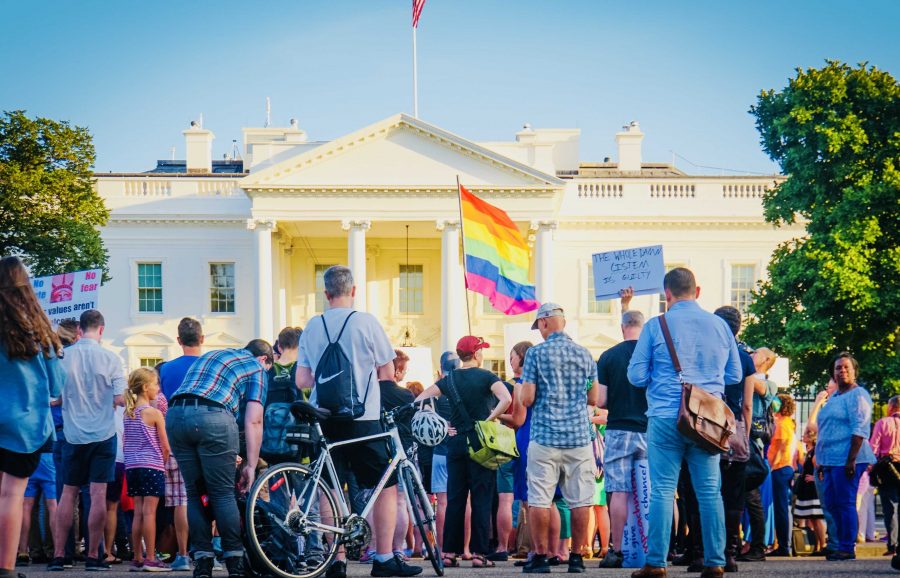Trans People Should Not be Redefined
Americans must continue to fight the Trump administration’s efforts to remove transgender identification in society (Courtesy of Flickr).
By Olivia Peterson
The new consideration from the Trump administration to strictly define gender based on genitalia and sex is perhaps one of the most dangerous governmental pushes regarding the rights of both transgender and non-binary populations. The decision to redefine gender on the basis of sex and genitalia would not only be an insensitive blatant ignoring of everyone who does not conform to traditional sex-based gender roles, but it would be incorrect.
Gender and sex have very loosely been considered interchangeable, but in fact there has been a distinguishable difference between the two since 1986, when the feminist movement defined gender as a distinction between femininity and masculinity, not female sex organs and male sex organs. Based on this definition, it is apparent that sex is focused on the biological makeup of a being—i.e. sexual organs—and gender relies more on the cultural and social differences between people, which thus makes it a spectrum instead of simple, distinguishable state of being. In fact, it is arguable that the only reason gender and sex have been so closely related is due to the systematically ingrained ideologies of gender roles that stem from distant historical times.
By attempting to redefine gender to share the same meaning of sex, the Trump administration would conflate two completely different ideas. The decision to do something like this, when it is apparent that there is no inherent connection between the two words, exposes the true intention of this prospective decision: to remove the protections and recognitions of trans and gender non-conforming people within American society. A decision like this would infringe on the visibility and recognition rights of countless individuals behind the veil of simply refining the definition of a word.
However, the desire to keep the sex of an individual documented on their birth certificate and medical records is understandable due to the medical necessity of this information, but it also brings up a significant, factual fallibility with this potential demarcation of gender. According to the New York Times, The Department of Health and Human Services makes it very clear that this new definition would identify individuals as either “male or female based on immutable biological traits identifiable by or before birth.”
This brings up the issue of people who are biologically not female or male, specifically referring to people with XXY chromosomes, who exhibit both “feminine” and “masculine” traits but are in fact, biologically neither. On the same basis that biological sex is important to disclose for medical reasons, it seems only logical that someone in this situation should also be documented accordingly. By this potential new definition of gender, these people would not exist.
Medical reasoning aside, there is simply no reason to conflate the meanings of gender and sex because they serve completely different purposes. Unless someone is prepared to argue that “femininity” and “masculinity” are inherent traits of sex, the two concepts have completely different meanings. There is no reason to deny a person the right to their gender identity because it has no inherent relation to sex. Furthermore, there are no obvious reasons why one’s biological sex and genetic makeup should serve any purpose in societal and cultural experiences, as the only reason they intersect currently is because of the preconstructed stereotypes stemming from ancient times.
However, the recognition of sex-based binary gender norms have long relied on recognizing gender identity of individuals because of the historical violence and limitations placed on individuals who have not conformed to sex-based gender norms. By failing to recognize an individual’s gender identity, the government would also fail to acknowledge the fundamental challenges these individuals have historically faced and continue to face in their everyday lives.
This redefinition would subsequently remove public and governmental recognition and governmental protections of varying gender-identifying persons. Overall, the change in the definition of gender to conflate with that of sex is—at the very least—unnecessary; but even that does not do justice to the true gravity of the situation.
This decision would remove any protection of transgender and non-binary identifying peoples from hate-crimes or violence, and strip them of mobility within society that they have worked for many years to establish.
Olivia Peterson, FCRH ’22, is an environmental policy and journalism major from Racine, Wisconsin.








Regan Hawkins • Dec 4, 2018 at 1:37 pm
I love what you have to say in this article. Such a great way to explain the issue at hand, respecting both sides and all the while communicating your point. Totally agree!